 W
WConstitutional law is a body of law which defines the role, powers, and structure of different entities within a state, namely, the executive, the parliament or legislature, and the judiciary; as well as the basic rights of citizens and, in federal countries such as the United States and Canada, the relationship between the central government and state, provincial, or territorial governments.
 W
WThe 1st Nepalese Constituent Assembly was a unicameral body of 601 members that served from May 28, 2008 to May 28, 2012. It was formed as a result of the first Constituent Assembly election held on April 10, 2008. The Constituent Assembly was tasked with writing a new constitution, and acting as the interim legislature for a term of two years. 240 members were elected in single-seat constituencies, 335 were elected through proportional representation, and the remaining 26 seats were reserved for nominated members.
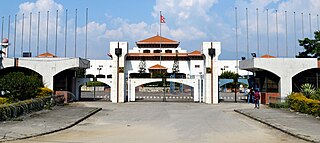 W
WThe Second Constituent Assembly of Nepal, later converted to the Legislature Parliament, was a unicameral legislature of Nepal. It was elected in the 2013 Constituent Assembly elections after the failure of the first Constituent Assembly to promulgate a new constitution. The Assembly converted into a legislative parliament after the constitution was promulgated in 2015. The legislature parliament's term ended on 14 October 2017.
 W
WAttorney-General v De Keyser's Royal Hotel Limited is a leading case in UK constitutional law decided by the House of Lords in 1920 which exhaustively considered the principles on which the courts decide whether statute has fettered prerogative power. It decided that the royal prerogative does not entitle the Crown to take possession of a subject's land or buildings for administrative purposes connected with the defence of the realm without paying compensation. It is the authority for the statement that the royal prerogative is placed in abeyance when statute law can provide a legal basis for an action.
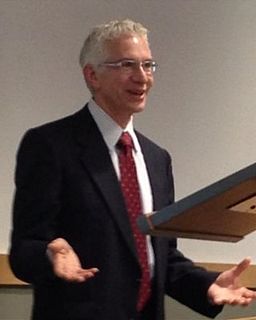 W
WLarry Catá Backer is a Cuban-American legal scholar and professor of law and international affairs. He holds a professorship at the Penn State University, and is the W. Richard and Mary Eshelman Faculty Scholar Professor of Law and International Affairs, Penn State Law and School of International Affairs, Pennsylvania State University (2001–), Ashgate Publishing Globalization Law & Policy Series editor (2010–), and the executive director of the Washington-based NGO Coalition for Peace and Ethics (2006–).
 W
WThe Basic Statute of the State is the cornerstone of the Omani legal system and it operates as a constitution for the country. The Basic Statute was issued in the year 1996 and thus far has only been amended once, in 2011, as a response to protests occurring during the Arab Spring.
 W
WA bill of rights, sometimes called a declaration of rights or a charter of rights, is a list of the most important rights to the citizens of a country. The purpose is to protect those rights against infringement from public officials and private citizens.
 W
WThe Centre for Political and Constitutional Studies, previously known as the Institute for Political Studies, is an autonomous agency associated with the Ministry for the Presidency of Spain.
 W
WThe Charter of Alliance, also known as Deed of Agreement was a treaty between the grand vizier of the Ottoman Empire and a number of powerful local rulers signed in 1808, in an attempt to regulate their power and relations with the central Ottoman government.
 W
WCivilian control of the military is a doctrine in military and political science that places ultimate responsibility for a country's strategic decision-making in the hands of the civilian political leadership, rather than professional military officers.
 W
WA constitutional convention is a gathering for the purpose of writing a new constitution or revising an existing constitution. Members of a constitutional convention are often, though not necessarily or entirely, elected by popular vote. However, a wholly popularly-elected constitutional convention can also be referred to as a constituent assembly.
 W
WThe Constitutional Council is the highest constitutional authority in France. It was established by the Constitution of the Fifth Republic on 4 October 1958 to ensure that constitutional principles and rules are upheld. It is housed in the Palais-Royal, Paris. Its main activity is to rule on whether proposed statutes conform with the Constitution, after they have been voted by Parliament and before they are signed into law by the President of the French Republic.
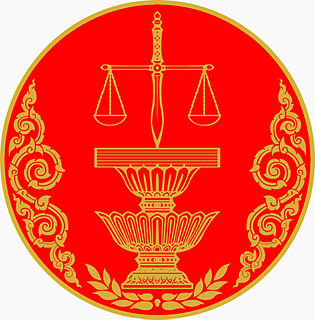 W
WThe Constitutional Court of the Kingdom of Thailand is an independent Thai court created by the 1997 Constitution with jurisdiction over the constitutionality of parliamentary acts, royal decrees, draft legislation, as well as the appointment and removal of public officials and issues regarding political parties. The current court is part of the judicial branch of the Thai national government.
 W
WThe Crown of Ireland Act 1542 is an Act passed by the Parliament of Ireland on 18 June 1542, which created the title of King of Ireland for King Henry VIII of England and his successors, who previously ruled the island as Lord of Ireland.
 W
WDisloyal: A Memoir: The True Story of the Former Personal Attorney to President Donald J. Trump is a 2020 book by Michael Cohen. In the memoir, Cohen recollects his time working as an attorney for Donald Trump from 2006 to 2018, his felony convictions, and other personal affairs. Throughout the book, Cohen alleges numerous incidents of wrongdoing by Trump.
 W
WDunne v Donohoe [2002] IESC 35, [2002] 2 IR 533 was an Irish Supreme Court Case wherein the court held that a Garda Superintendent was a persona designata and that a guideline issued the Garda Commissioner that imposed fixed preconditions to applications for a firearm certificate would result in the superintendent acting Ultra Vires. By ruling that the guideline interfered with the status of a superintendent as a persona designata, the Court provided an important finding in establishing the limits of discretionary powers under the Irish constitution and the legal standing of guidelines issued under the auspices of a national body.
 W
WDziennik Ustaw or Dziennik Ustaw Rzeczypospolitej Polskiej is the most important Polish publication of legal acts. It is the only official source of law for promulgation of Polish laws. The publication of this journal is solely the responsibility of the Prime Minister of the Republic of Poland. 'Dziennik Ustaw' traces its history to the 1918 'Dziennik Praw Królestwa Polskiego' and has changed its name several times during its existence.
 W
WThe estates of the realm, or three estates, were the broad orders of social hierarchy used in Christendom from the Middle Ages to early modern Europe. Different systems for dividing society members into estates developed and evolved over time.
 W
W"Everything which is not forbidden is allowed" is a constitutional principle. It is the concept that any action can be taken by an individual or a body unless there is a law against it. It is also known in some situations as the "general power of competence" whereby the body or person being regulated is acknowledged to have competent judgement of their scope of action. The opposite is a principle whereby an action can only be taken if it is specifically allowed. The general power of competence operates in most states and societies as it is much easier to specify what cannot be done, than listing what can be done.
 W
WChinese federalism refers to political theories which argue that China's central government should share sovereignty with regional entities, under a form of federalism. Such proposals were made in the early twentieth century, in connection with the end of the Qing dynasty; as well as recently, with a view to providing checks against the power of the central government, as well as settling the relationship between Mainland China, Taiwan, Hong Kong, Macau, and other potential political entities.
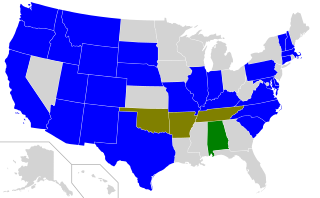 W
WA free elections law, also known as a free and equal elections clause, is a section in many U.S. state constitutions which mandates that elections of public officials shall be free and not influence by other powers. Most such laws were placed into state constitutions in the late 18th and early 19th century.
 W
WGlik v. Cunniffe, 655 F.3d 78 is a case in which the United States Court of Appeals for the First Circuit held that a private citizen has the right to record video and audio of police carrying out their duties in a public place, and that the arrest of the citizen for a wiretapping violation violated his First and Fourth Amendment rights. The case arose when Simon Glik filmed Boston, Massachusetts, police officers from the bicycle unit making an arrest in a public park. When the officers observed that Glik was recording the arrest, they arrested him and Glik was subsequently charged with wiretapping, disturbing the peace, and aiding in the escape of a prisoner. Glik then sued the City of Boston and the arresting officers, claiming that they violated his constitutional rights.
 W
WGovernment by Judiciary is a 1977 book by constitutional scholar and law professor Raoul Berger which argues that the U.S. Supreme Court has interpreted the Fourteenth Amendment of the U.S. Constitution contrary to the original intent of the framers of this Amendment and that the U.S. Supreme Court has thus usurped the authority of the American people to govern themselves and decide their own destiny. Berger argues that the U.S. Supreme Court is not actually empowered to rewrite the U.S. Constitution – including under the guise of interpretation – and that thus the U.S. Supreme Court has consistently overstepped its designated authority when it used its powers of interpretation to de facto rewrite the U.S. Constitution in order to reshape it more to its own liking.
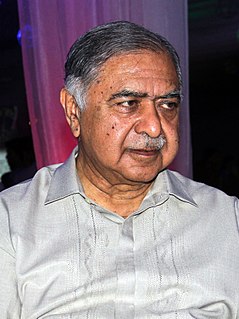 W
WKamal Hossain is a Bangladeshi lawyer and politician. He is head of Kamal Hossain & Associates, a law firm based in Dhaka, the capital of Bangladesh. Hossain is the founder and president of the Gano Forum political party and leader of the Jatiya Oikya Front alliance. He is widely regarded as an icon of secular democracy in South Asia. Hossain is the leader of the pro-democracy movement in Bangladesh.
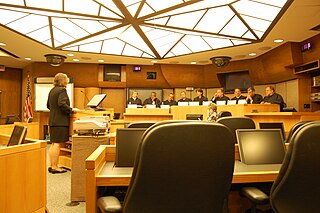 W
WThe Institute of Bill of Rights Law (IBRL), founded in 1982, is a center for the study of constitutional law at the William & Mary School of Law in Williamsburg, Virginia, United States. The IBRL focuses on enhancing a scholarly understanding of the nation's Bill of Rights by hosting an annual "Supreme Court Preview" that brings together constitutional and legal experts from law schools in the United States, as well as reporters and affiliates from the nation's news outlets. It also enables research fellows to conduct constitutional research with law professors at the law school, and co-sponsors the Constitutional Conflicts book series with Duke University Law School. The Institute of Bill of Rights Law sponsors events such as Constitutional Originalism debates and various symposiums.
 W
WKesavananda Bharati Sripadagalvaru & Ors. v. State of Kerala & Anr., also known as the Kesavananda Bharati judgement, is a landmark decision of the Supreme Court of India that outlined the basic structure doctrine of the Indian Constitution.
 W
WThe Law Terms Act 1830 was an Act of the Parliament of the United Kingdom that made various changes to the court system of England and Wales.
 W
WThe legal systems of Eritrea go as far back as the 14th century. Before independence, Eritrea was colonized by Italy and later occupied by Britain, therefore subjugated to those nations' laws through the World War II era. In the 1950s, the United Nations gave neighboring Ethiopia power and responsibility for Eritrea, and thus its legal system mirrored that of Ethiopia. After gaining its independence in 1993, Eritrea began to draft its own constitution, which was implemented in 1997. Much of Eritrea's judicial system is spelled out in this Constitution. However, even today, customary law has remained the most prevalent law in the lives of most Eritreans.
 W
WA metaconstitution is a set of pre-constitutional rules. It is in lieu of a formalized constitution and consists of accepted axiomatic policy. The constitution is similar to or developed from this. A metaconstitution is also less binding, and can be used to a less rigid form of government. To many nations, the metaconstitution provides an "exit-option", where they may variate from the written document. A metaconstitution, unlike formal constitutions, never needs to be written. Its creation results from the morality and judgment of the people. To be formulated, the people must be generally opposed to anarchy and must desire some form of governing force.
 W
W"No taxation without representation" is a political slogan that originated in the American Revolution, and which expressed one of the primary grievances of the American colonists against Great Britain. In short, many colonists believed that as they were not represented in the distant British parliament, any taxes it imposed on the colonists were unconstitutional, and were a denial of the colonists' rights as Englishmen.
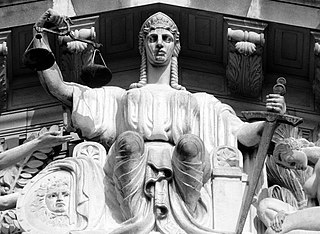 W
WAn ouster clause or privative clause is, in countries with common law legal systems, a clause or provision included in a piece of legislation by a legislative body to exclude judicial review of acts and decisions of the executive by stripping the courts of their supervisory judicial function. According to the doctrine of the separation of powers, one of the important functions of the judiciary is to keep the executive in check by ensuring that its acts comply with the law, including, where applicable, the constitution. Ouster clauses prevent courts from carrying out this function, but may be justified on the ground that they preserve the powers of the executive and promote the finality of its acts and decisions.
 W
WThe Philip Morris v. Uruguay case started on 19 February 2010, when the multinational tobacco company Philip Morris International filed a complaint against Uruguay. The company complained that Uruguay's anti-smoking legislation devalued its cigarette trademarks and investments in the country and was suing Uruguay for compensation under the bilateral investment treaty between Switzerland and Uruguay.
 W
WSalus populi suprema lex esto is a maxim or principle found in Cicero's De Legibus.
 W
WA special delegation in a municipal organization is a delegation of several members appointed by a representative of the state following the dissolution or resignation of a municipal council or another organization to perform the functions of mayor or president. The powers of a special delegation are limited to acts of pure administration and emergency management.
 W
WA state of emergency or emergency powers is a situation in which a government is empowered to be able to put through policies that it would normally not be permitted to do, for the safety and protection of their citizens. A government can declare such a state during a natural disaster, civil unrest, armed conflict, medical pandemic or epidemic or other biosecurity risk. Justitium is its equivalent in Roman law—a concept in which the Roman Senate could put forward a final decree that was not subject to dispute yet helped save lives in times of strife.
 W
WThe Supreme Court of Justice of Colombia in Bogotá is the highest judicial body in civil and penal matters and issues of criminal and civil procedure in Colombia. The Supreme Court of Colombia is the highest authority in regard to the interpretation of administrative law, constitutional law, and the administration of the judiciary.
 W
WTaylor v Attorney-General [2015] NZHC 1706 is a New Zealand High Court judgment which made a formal declaration that a statute that prohibited prisoners from voting is inconsistent with the New Zealand Bill of Rights Act 1990. The action was brought by Arthur Taylor, a high-profile prison inmate. This was the first time a court had recognised that a formal declaration of inconsistency is an available remedy for statutory breaches of the Bill of Rights. Section 5 of the Bill of Rights Act states, "Subject to section 4, the rights and freedoms contained in this Bill of Rights may be subject only to such reasonable limits prescribed by law as can be demonstrably justified in a free and democratic society." In his decision, Justice Heath declared that the Electoral Amendment Act 2010 which stripped all voting rights in general elections from prisoners was an unjustified limitation on the right to vote contained in s 12 of the Bill of Rights. The Court of Appeal upheld this decision after the Attorney-General appealed the jurisdiction of the courts to make declarations of inconsistency.
 W
WThoughts on Government, or in full Thoughts on Government, Applicable to the Present State of the American Colonies, was written by John Adams during the spring of 1776 in response to a resolution of the North Carolina Provincial Congress which requested Adams' suggestions on the establishment of a new government and the drafting of a constitution. Adams says that "Politics is the Science of human Happiness -and the Felicity of Societies depends on the Constitutions of Government under which they live." Many of the ideas put forth in Adams' essay were adopted in December 1776 by the framers of North Carolina's first constitution.
 W
WVoting rights in the United States, specifically the enfranchisement and disenfranchisement of different groups, has been a moral and political issue throughout United States history.